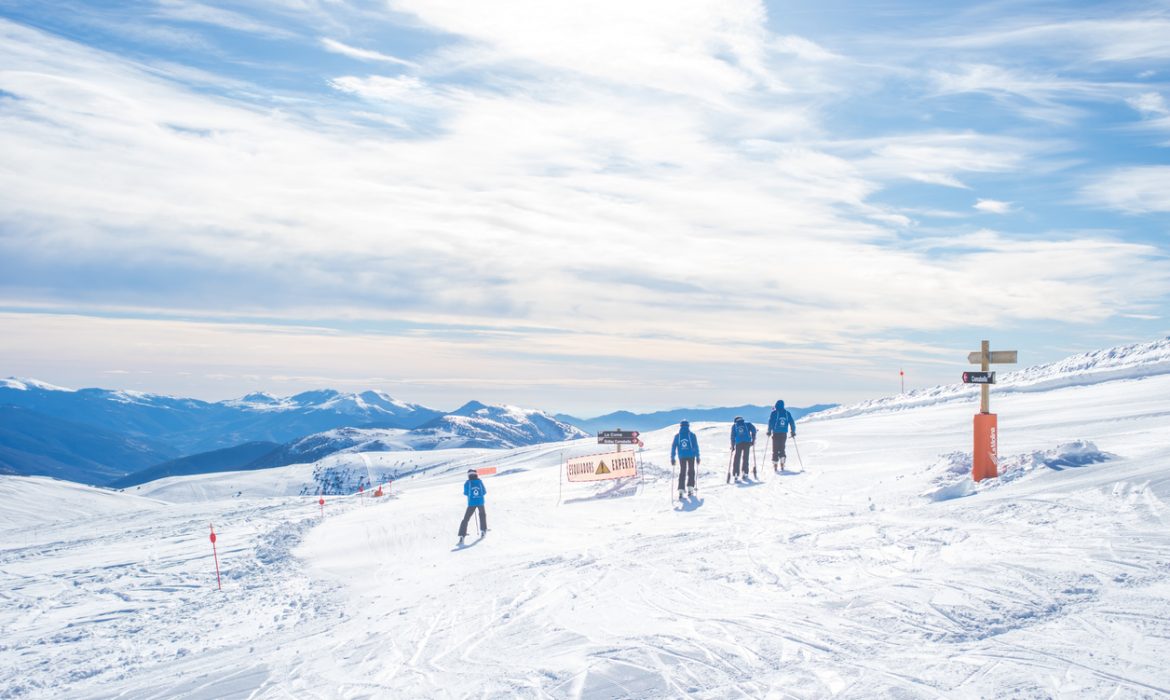As France grapples with its second warmest winter since 1900, once popular ski resorts are grappling with some tough choices: bring in fresh snow, find new tourist activities, or die.
In Mont-Dore, a resort in the central Auvergne region, the ski-lift operator went into administration on Monday with a 1.7 million euro ($1.9 million) hole in its accounts, blaming the lack of snow during the peak February season.
“Climate conditions have changed. The last time we had so little snow during the February school break was 30 years ago,” managing director Patrick Deat told the Thomson Reuters Foundation, as an administrator reviews its business plan.
The company will continue to operate and the jobs of its 21 employees will be safeguarded for up to 18 months, but finding a quick replacement for the lost revenues from the lucrative ski season will not be easy, he said.
Sporting events worldwide are having to adapt to climate change. The 2020 Summer Olympics in Japan and the 2022 soccer World Cup in Qatar have switched schedules and installed cooling systems to protect athletes and spectators from extreme heat.
Ski resorts in Japan and Norway have also been hit by a shortfall of snow, and one of the worst seasons on record.
France is among the world’s top skiing destinations, along with Austria and the United States, with about 10 million annual visitors generating 10 billion euros in revenues and creating some 120,000 jobs, said industry body Domaines Skiables.
“A number of resorts are in a rather difficult situation,” said Joel Retailleau, managing director of ANMSM, the umbrella body for the mayors of French ski resorts.
“Skiing will remain an important activity and remains essential to France’s tourism policy, but we will need to develop a number of new offers to respond to tourists’ demand and climate evolution.”
A few French resorts have already moved beyond skiing to attract tourists with alternative activities like wellbeing, food and culture tours, snowshoeing and snow mountain biking in a bid to adapt the local economy to warmer winters.
ARTIFICIAL SNOW
Since the end of the 19th century, Europe’s highest mountain range, the Alps, has seen an average temperature rise of 2 degrees Celsius (3.6 degrees Fahrenheit), according to scientific journal Arctic, Antarctic, and Alpine Research.
The effect of climate warming has been stronger on winter temperatures, making snow increasingly rare at lower-altitude ski resorts below 1,500 metres.
The University of Grenoble found that almost half of the 169 ski resorts that have closed since 1951 – the first year to record a closure – went out of business due to lack of snow.
Some resorts have turned to artificial snow, produced by forcing water and pressurised air through a “snow cannon” to supplement natural snow.
But their sustainability is questionable. Producing just a cubic metre of artificial snow costs 2.5 euros, consumes half a cubic metre of water and requires 1 to 3 kilowatts of electricity, according to Domaines Skiables.
“In France, we make a judicious use of snow cannons, using them on 30% of slopes, against 70% in Italy and 80% in Switzerland,” Retailleau said.
Snow cannons also need below-zero temperatures to operate, meaning they will not be a viable long-term solution if winter temperatures keep rising.
A few resorts have tried to expand their pistes towards higher altitudes, attracting the wrath of environmental groups who say the construction of more ski lifts will further blight the landscape.
Others have moved towards sustainable activities that can lure visitors year round. Chamrousse in southeast France has invested in conference facilities, summer tobogganing and an aquatic centre to lessen its reliance on winter sports.
It is an approach supported by environment minister Elisabeth Borne who criticised Luchon-Superbagneres authorities for airlifting snow to its slopes during the February school break, which usually provides 60% of the resort’s income.
With just six of its 28 pistes open due to warm weather, officials paid about 5,000 euros for a helicopter to scoop up 50 tonnes of snow from nearby mountaintops and drop it on to the bare slopes of the town in France’s southwestern Pyrenees.
“Bringing snow by truck or helicopter to resorts to continue pretending nothing has happened? The world has gone topsy turvy! It’s time to change,” Borne said on Twitter. ($1 = 0.8937 euros) (Reporting by Elena Berton; Editing by Katy Migiro. Please credit the Thomson Reuters Foundation, the charitable arm of Thomson Reuters, that covers the lives of people around the world who struggle to live freely or fairly.






